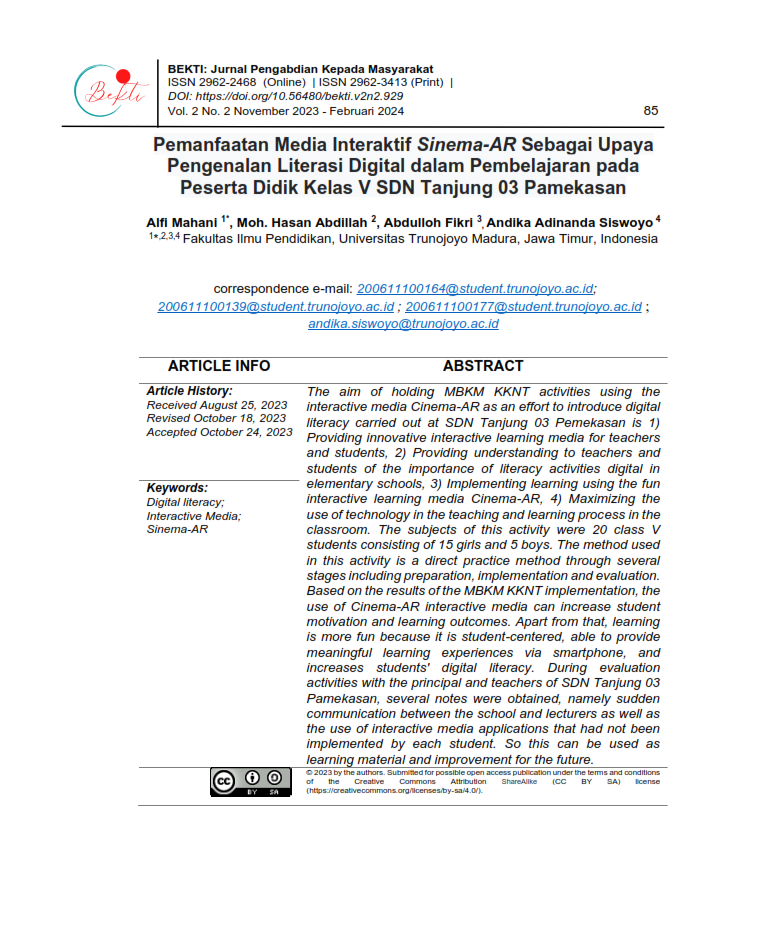Pemanfaatan Media Interaktif Sinema-AR Sebagai Upaya Pengenalan Literasi Digital dalam Pembelajaran pada Peserta Didik Kelas V SDN Tanjung 03 Pamekasan
DOI:
https://doi.org/10.56480/bekti.v2i2.929
 Abstract View:
Abstract View:
105
 PDF downloads:
PDF downloads:
78
Keywords:
Digital literacy, Interactive Media, Sinema-ARAbstract
The aim of holding MBKM KKNT activities using the interactive media Cinema-AR as an effort to introduce digital literacy carried out at SDN Tanjung 03 Pemekasan is 1) Providing innovative interactive learning media for teachers and students, 2) Providing understanding to teachers and students of the importance of literacy activities digital in elementary schools, 3) Implementing learning using the fun interactive learning media Cinema-AR, 4) Maximizing the use of technology in the teaching and learning process in the classroom. The subjects of this activity were 20 class V students consisting of 15 girls and 5 boys. The method used in this activity is a direct practice method through several stages including preparation, implementation and evaluation. Based on the results of the MBKM KKNT implementation, the use of Cinema-AR interactive media can increase student motivation and learning outcomes. Apart from that, learning is more fun because it is student-centered, able to provide meaningful learning experiences via smartphone, and increases students' digital literacy. During evaluation activities with the principal and teachers of SDN Tanjung 03 Pamekasan, several notes were obtained, namely sudden communication between the school and lecturers as well as the use of interactive media applications that had not been implemented by each student. So this can be used as learning material and improvement for the future.
References
Emimah, H. Festival Sinema Australia Indonesia (Fsai) Sebagai Sarana Diplomasi Publik Australia Terhadap Indonesia Tahun 2016-2022 (Bachelor's thesis, Program Studi Ilmu Hubungan Internasional Fakultas Ilmu Sosial Dan Ilmu Politik Universitas Islam Negeri Syarif Hidayatullah Jakarta).
Glister, P., & Watson, T. 1997. An Excerpt From Digital Literacy. Digital Literacy.
INDAH PERMATA SARI, D. E. F. F. I. T. A., Prayitno, H. J., & Rahmawati, L. E. (2022). Pembudayaan Literasi Digital Dalam Pembelajaran Tematik Jenjang Pendidikan Dasar Di Giritontro (Doctoral dissertation, Universitas Muhammadiyah Surakarta).
Ismail, A., Nojeng, A., Fakhri, M. M., & Jamaluddin, A. B. (2023). PKM Digitalisasi Pembelajaran: Meningkatkan Literasi Digital Melalui Aplikasi Kinemaster. Vokatek: Jurnal Pengabdian Masyarakat, 1(3), 198-206.
Kemendikbud. 2018. Gerakan Literasi Sekolah. Jakarta : Direktorat Jenderal Pendidikan Dasar dan Menengah Kemendikbud.
Mardiana, S., Putri, L. D., & Surahman, S. (2022). Literasi Digital dalam Upaya Mendukung Pembelajaran Online pada Siswa Sekolah Dasar di Kota Cilegon. Kaibon Abhinaya: Jurnal Pengabdian Masyarakat, 4(1), 47-54.
Muhklis, D. A., Fiyani, C., & Pratama, K. (2023). Tinjauan Literatur Pemanfaatan Teknologi Pembelajaran Terhadap Keterampilan Literasi Digital Pada Mata Pelajaran IPA di Sekolah Dasar. Jurnal Pendidikan dan Pembelajaran, 2(02), 13-27.
Munir. 2012. Multimedia: Konsep dan Apikasi dalam Pendidikan. Bandung: Alfabeta
Negeri, D. L. M. U. MENINGKATKAN KEMAMPUAN LITERASI DIGITAL GURU BAHASA INGGRIS MELALUI PEMBUATAN MEDIA PEMBELAJARAN INTERAKTIF.
Nugraha, D. (2022). Literasi Digital dan Pembelajaran Sastra Berpaut Literasi Digital di Tingkat Sekolah Dasar. Jurnal Basicedu, 6(6), 9230-9244.
Nugroho, M. W. (2022). Perspektif mahasiswa terhadap literasi digital di aplikasi Instagram sebagai media pembelajaran Bahasa Indonesia. Literasi: Jurnal Bahasa dan Sastra Indonesia serta Pembelajarannya, 6(1), 26-35.
Nurkhasanah, S. (2022). Penggunaan media game online melalui proprofs untuk meningkatkan literasi digital siswa di SMP negeri 1 gangga. Jurnal Paedagogy, 9(2), 248-254.
Putra, L. D., & Pratama, S. Z. A. (2023). Pemanfatan media dan teknologi digital dalam mengatasi masalah pembelajaran. Journal Transformation of Mandalika, 4(8), 323-329.
Romadani, M. H. (2023). Upaya Pengenalan Literasi Digital Melalui Aplikasi Youtube Pada Siswa Kelas Iv Di Sdn Bicorong 2 Pakong Pamekasan. MUBTADI: Jurnal Pendidikan Ibtidaiyah, 4(2), 136-149.
Selsabila, V., & Pramudiani, P. (2022). Pengembangan Media Pembelajaran Interaktif Articulate Storyline Berbasis Literasi Digital Pada Pembelajaran IPS bagi Siswa Madrasah Ibtidaiyah Negeri. Jurnal Paedagogy, 9(3), 458-466.
Siswoyo, A. A., Pratama, D. J., Patriana, M. P., Puspita, W. P. D., Nizar, R. C., & Fikri, A. (2023, March). PEMANFAATAN MULTIMEDIA INTERAKTIF SEBAGAI UPAYA PENGENALAN LITERASI DIGITAL DAN LITERASI BUDAYA. In Prosiding Seminar Nasional Sinergi Riset dan Inovasi (Vol. 1, No. 1, pp. 123-130).
Sulistyarini, W., & Fatonah, S. (2022). Pengaruh Pemahaman Literasi Digital dan Pemanfaatan Media Pembelajaran Terhadap Kompetensi Pedagogik Guru Era Digital Learning. Journal of Educational Learning and Innovation (ELIa), 2(1), 42-72.
Tilaar, H. A. R. 2004. Pengembangan sumber Daya Manusia Dalam Era Globalisasi. Jakarta : PT Gramedia Widiasarana Indonesia.
Tim GLN Kemendikbud. 2017. Lietrasi Digital In Gerakan Literasi Nasional.
Uspayanti, R., & Pandiangan, N. (2023). Pelatihan Pembuatan E-book dan Soal Berbasis HOTs Interaktif untuk Meningkatkan Kemampuan Literasi Digital Guru SMP YPK Merauke. Jurnal Pengabdian UNDIKMA, 4(2), 395-403.

Downloads
Published
How to Cite
Issue
Section
License
Copyright (c) 2023 Alfi Mahani, Moh. Hasan Abdillah, Abdulloh Fikri , Andika Adinanda Siswoyo

This work is licensed under a Creative Commons Attribution-ShareAlike 4.0 International License.
Copyright Notice
Authors who publish with this journal agree to the following terms:
- Authors retain copyright and grant the journal right of first publication with the work simultaneously licensed under a Creative Commons Attribution-ShareAlike 4.0 International License that allows others to share the work with an acknowledgment of the work's authorship and initial publication in this journal.
- Authors are able to enter into separate, additional contractual arrangements for the non-exclusive distribution of the journal's published version of the work (e.g., post it to an institutional repository or publish it in a book), with an acknowledgment of its initial publication in this journal.
- Authors are permitted and encouraged to post their work online (e.g., in institutional repositories or on their website) prior to and during the submission process, as it can lead to productive exchanges, as well as earlier and greater citation of published work (See The Effect of Open Access).

This work is licensed under a Creative Commons Attribution-ShareAlike 4.0 International License.











